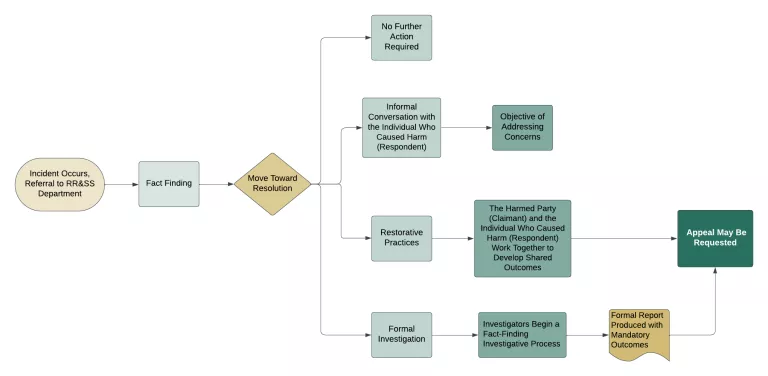According to UNBC, non-academic misconduct is defined as, "behaviour(s) a student knows, or ought to reasonably know, would have an adverse effect" on the following:
- Safety of themselves or others.
- Integrity or proper functioning of the University and its activities.
- Use and enjoyment of University facilities.
- Condition of University property, or property of others being used by the University or in association with a University activity.
When a situation involving non-academic misconduct arises, a referral may be made to the Restorative Relations and Student Supports (RR&SS) department. At this point, student(s) and impacted individuals will be contacted to gather additional information about the incident. Once information has been gathered, those involved will determine next steps, which might include:
- Taking no further action.
- Requesting an informal conversation towards a resolution.
- Utilizing restorative practices.
- Initiating a formal report; this may involve a formalized investigation to produce formal outcomes or sanctions.
To foster a safe and inclusive environment, UNBC has a student code of conduct outlining community expectations.
The non-academic misconduct process can feel stressful and we encourage you to take advantage of campus and community support. The Restorative Relations and Student Supports department can connect you to helpful resources.
Contact us
Email: connectu@unbc.ca
Phone: 250-960-5596
Process for addressing non-academic misconduct
- The Restorative Relations and Student Supports (RR&SS) Department will receive a referral.
- A member of the team will then schedule a meeting with the impacted individual(s).
- If you receive a notice or request to meet, keep in mind that this provides an opportunity to learn more about the process and gives you a space to offer additional information relevant to the incident.
- During initial conversations, our team may gather documentary or physical evidence from the individuals involved.
- Interim measures may be put in place to maintain a safe campus environment. Interim measures are not disciplinary. They are temporary measures needed to support those impacted.
- After collecting enough information, those impacted can move towards a resolution option. The individuals involved may be presented with these options:
- No further action: After expressing their concerns, the student decides they no longer want to pursue a resolution.
- Informal conversation: Informal conversation to address concerns.
- Restorative practices: Restorative processes are utilized to rebuild trust and work toward a resolution. This is often done collaboratively where the harmed party (claimant) and the individual who caused harm (respondent) work together to develop shared outcomes.
- Formal investigation: In cases of higher complexity and severity a claimant may choose to file a formal report. If the formal report meets the threshold for a formal investigation, trained investigators will initiate a fact-finding investigative process.
- No further action: After expressing their concerns, the student decides they no longer want to pursue a resolution.
- When a decision of responsibility is made, both collaborative and/or mandatory outcomes will be defined.
- Where appropriate, the primary goals of outcomes are education and the reparation of harm using restorative approaches. In some cases, mandatory outcomes are used to ensure the safety and well-being of those involved.
- In the event an appeal is desired, a request may be made in accordance with the procedures defined within the non-academic misconduct process.
